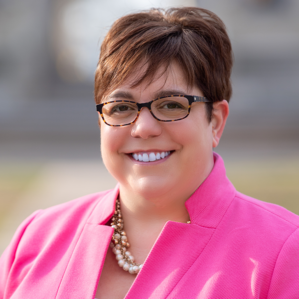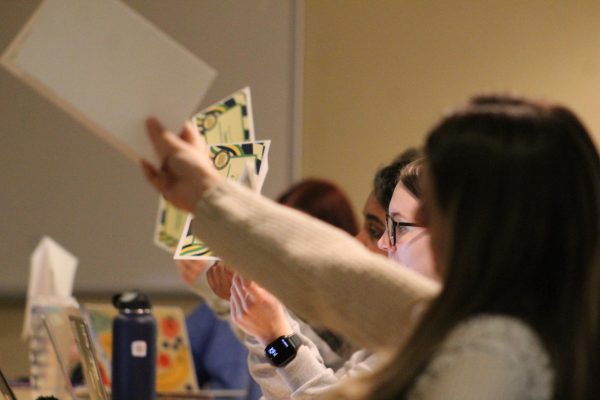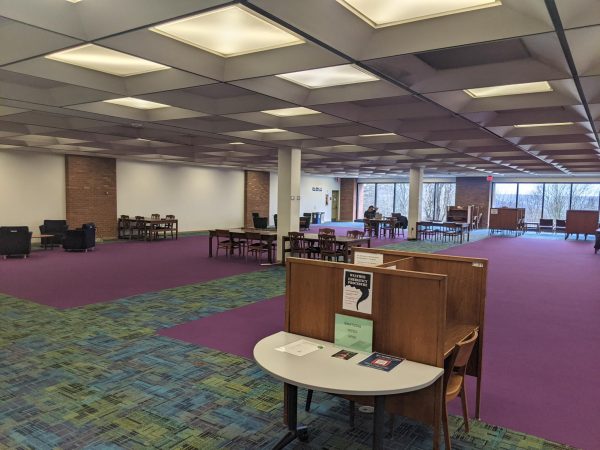Fulbright recipient visits college to discuss award
Fulbright Scholarship Award winner Kelly Frantz, ’16, Skyped into the Henderson Campus Center Tuesday, Feb. 27, to discuss the process, the experience and what happens after a student applies for a Fulbright Scholarship. Susan Slote hosted the event “Cupcakes and Conversation” in order to get current Allegheny students interested in applying and to know what to expect if they were to win the award.
Frantz began the conversation by informing the participants of the event on what extracurriculars and classes she took while at Allegheny. Her interests revolved around education and language which has since led her to teach English in Ecuador and go into a masters program at Columbia University Teachers College.
At Allegheny, Frantz was the president of the student pre-education club, took in a teaching internship where she learned life-changing teaching styles, and taught Spanish to fifth graders all the while double majoring in international studies and Spanish and minoring in educational studies.
Though education and extracurriculars are beneficial in winning the Fulbright Scholarship, the application itself takes a lot of time and dedication. Frantz knew she wanted to apply to go to Ecuador soon after she arrived back the United States after studying abroad there during her junior year. During her study abroad, the semester was split into two sections — during the first half, students take classes, and in the second they must take internships. Frantz chose teaching.
“If anyone is thinking about applying for the Fulbright, start early,” Frantz said. “It’s doable, it’s achievable. Put a lot of time and a lot of thought into your essays.”
The application for the scholarship is due in October and is comprised of two one page essays. One is about the applicant and their accomplishments and interests, while the other is about the grant’s purpose. If the applicant plans on traveling to Germany or a Spanish speaking country, then they must also include a letter of recommendation for the language requirement.
Event participant Emily Rice, ’21, asked what other countries are included besides Ecuador in the Fulbright. Professor Assistant Professor and Director of Fellowship Advising Patrick Jackson, who helped Frantz apply for the scholarship, said participants could choose from 85 countries. If you look it up on Google you can see all the countries listed according to Jackson.
“It’s all the countries in the world with a solid infrastructure and no civil wars,” said Jackson. “If there’s a region you want to go to and can’t get to a specific country, you can get pretty damn close.”
Another student, Elia Sherman, ’18, asked what the difference between Fulbright and the Peace Corps is. Frantz thought they two were difficult to choose between, but when it came down to it, the Fulbright helps more to prepare for graduate programs with the grant that was given while the Peace Corps is more volunteer based.
Student participant, Masha Serguievski, ’20, asked if applicants need a educational background. Slote and Frantz agreed that the background was not required, yet it was highly beneficial when working with students in other countries and certainly gave an upper hand when applying to many countries.
Currently, Frantz is studying for her masters degree at Columbia University Teachers College, as well as working with Columbia professor, Dr. Hoa Nguyen on a research project in the field of acquisition.
Shoshana Robbins, ’19, asked why Frantz chose Columbia. Allegheny’s connection to the teachers program there is incredibly strong, making Allegheny students take priority in getting into the school. The school also has three programs: applied linguistics and teaching English to speakers of other languages TESOL program for both general adult populations and kindergarten through 12th grade.
Frantz is working with the general TESOL program and plans on going back to Ecuador to teach for a couple years, then do more research in the field.
The scholarship is difficult to get but not impossible, and incredibly worth it according to professors who attended the event. Those who attempt to get the award should be prepared for how competitive it is, according to Jackson.
“It’s competitive, but achievable,” Jackson said.








